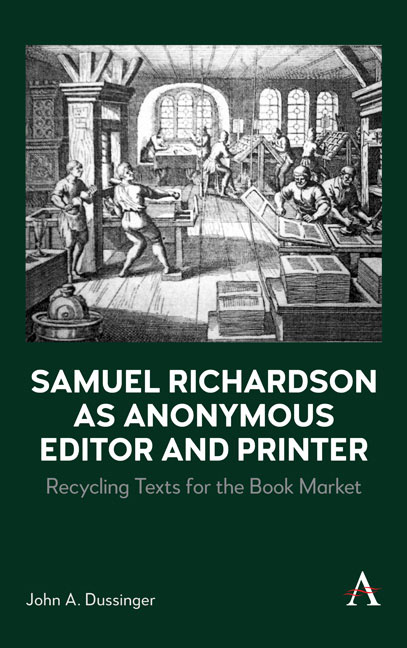Book contents
- Frontmatter
- Contents
- 1 Introduction to The True Briton: Oaths of Allegiance and Women’s Empowerment
- 2 Selected Texts of The True Briton
- 3 Introduction to The Weekly Miscellany: Sarah Chapone, Women’s “Championess”
- 4 Selected Texts of The Weekly Miscellany
- Conclusion: Richardson’s Press and Women’s Entry into Public Life
- Bibliography
- Index
Conclusion: Richardson’s Press and Women’s Entry into Public Life
Published online by Cambridge University Press: 13 April 2024
- Frontmatter
- Contents
- 1 Introduction to The True Briton: Oaths of Allegiance and Women’s Empowerment
- 2 Selected Texts of The True Briton
- 3 Introduction to The Weekly Miscellany: Sarah Chapone, Women’s “Championess”
- 4 Selected Texts of The Weekly Miscellany
- Conclusion: Richardson’s Press and Women’s Entry into Public Life
- Bibliography
- Index
Summary
During the first two decades of his career, Richardson's role as printer was hardly limited to setting the type for the periodicals that were issued from his shop. Perhaps the most glaring evidence of his intervention in producing text is the fact that both The True Briton and The Weekly Miscellany just happen to have letters supposedly from women who protested the legal restraints against their participation in the public sphere. Neither the Duke of Wharton, the owner of The True Briton, nor William Webster, the desperately impecunious producer of The Weekly Miscellany, launched their journals with the objective of advancing radical views about political equality for women. But almost inadvertently, this middle-aged, rotund printer at Salisbury Court was quietly feminizing journalism.
As an outlier in what was perceived to be a corrupt, predatory political world, Richardson readily assumed a female role as victim and the subversive strategy of passive resistance. The Non-juror TB females voiced dilemmas over being required to swear oaths of loyalty to a government that their consciences could not support:
For my own Part, I am under the greatest Anxiety, having a small Fortune, and a numerous Family: If I take the Oaths required of me, I swear to Things I have no certain Knowledge of; and the Author of The Whole Duty of Man tells me (Page the 100) “If I swear to the Truth of that whereof I am only doubtful, though the Thing should happen to be true; yet it brings upon me the Guilt of Perjury; for I swear at a Venture, and the Thing might, for ought I know, be as well false as true; whereas I ought never to swear any thing the Truth of which I do not certainly know.”
This oath of obedience to government authority also includes the dilemma concerning marriage vows and the legal dominance of husbands over wives, as Sarah Chapone argues:
In Short, either Wives can judge how far, and in what Instances an Husband is to be obeyed, or they cannot: If they are so undiscerning as not to be able to perceive the essential Difference between obeying their Husbands in the Lord, and in the direct Opposition to and Defiance of him; then let their blind Obedience to their Husbands excuse them in the Case of Treason as well as it does in other Cases:
- Type
- Chapter
- Information
- Samuel Richardson as Anonymous Editor and PrinterRecycling Texts for the Book Market, pp. 129 - 132Publisher: Anthem PressPrint publication year: 2024

